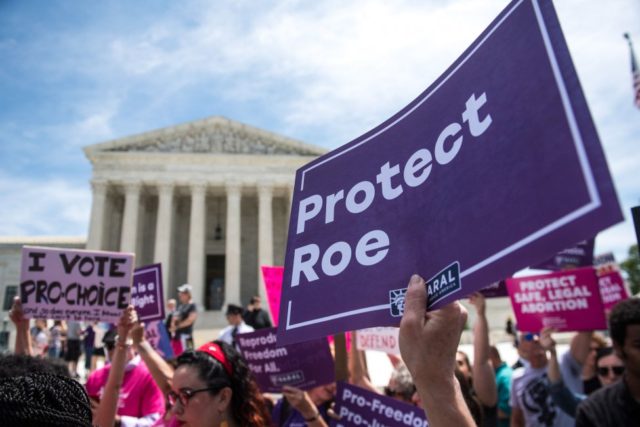Sept. 2 (UPI) — The Supreme Court late Wednesday declined to block a controversial Texas law that bans abortions after six weeks into pregnancy.
The high court voted 5-4 against abortion providers in the state who had filed an emergency application for relief against the law that went into effect Wednesday. Chief Justice John Roberts joined the three liberal judges in dissent.
The majority in its unsigned opinion said applicant Whole Woman’s Health raised “serious questions” about the law’s constitutionality but its application “presents complex and novel antecedent procedural questions” they did not not answer.
“In reaching this conclusion, we stress that we do not purport to resolve definitively any jurisdictional or substantive claim in the applicants’ lawsuit,” the majority wrote. “In particular, this order is not based on any conclusion about the constitutionality of Texas’ law, and in no way limits other procedurally proper challenges to the Texas law, including in Texas state courts.”
The majority said because of how the law is written, it is unknown if it will ever be enforced.
Roberts, joined by Justices Stephen Breyer and Elena Kagan, wrote in his dissent that the law before them is “not only unusual but unprecedented.”
The Republican-led law, SB8, which was passed by Texas lawmakers and signed by Gov. Greg Abbott in May, outlaws abortions when a heartbeat is detectable, which is about six weeks into a pregnancy and often before one knows they are pregnant. It will deny the procedure to at least 85% of patients who seek it in the state.
The ban is enforced by members of the public who are able to sue anyone who provides or is involved in aiding and performing abortions after a heartbeat in the fetus is detected.
Roberts said the reasoning for putting enforcement of the law upon the public is to “insulate the state from responsibility for implementing and enforcing the regulatory regime.”
He said he would have granted the injunction prior to the law going into effect so courts could have considered whether a state can shift responsibility for enforcing its laws to the public.
“We are at this point asked to resolve these novel questions — at least preliminarily — in the first instance, in the course of two days, without the benefit of consideration by the District Court or Court of Appeals,” he wrote, adding that they are expected to rule on the issue without briefings and oral arguments.
Breyer, in another written dissent, said the law delegates private individuals the power to prevent women from having an abortion during the first stage of pregnancy, despite women having the constitutional right to do so.
“This court’s order is stunning” Justice Sonia Sotomayor wrote in another dissent. “Presented with an application to enjoin a flagrantly unconstitutional law engineered to prohibit women from exercising their constitutional rights and evade judicial scrutiny, a majority of justices have opted to bury their heads in the sand.”
Sotomayor said the state didn’t attempt tp argue that the law was constitutional as there is no way it could.
“Taken together, the act is a breathtaking act of defiance — of the Constitution, of this court’s precedents and of the rights of women seeking abortions throughout Texas,” she wrote, adding that the majority’s decision tells the nation that the state’s “gambit” to evade federal judicial scrutiny worked.
“The court should not be so content to ignore its constitutional obligations to protect not only the rights of women, but also the sanctity of its precedents and the rule of law,” she concluded.
President Joe Biden condemned the high court’s decision in a statement Thursday.
“The Supreme Court’s ruling overnight is an unprecedented assault on a woman’s constitutional rights,” he said.
Whole Woman’s Health said it was “shocked and heartbroken” by the Supreme Court’s decision.
“We are devastated by today’s ruling,” Amy Hagstrom Miller, chief operating officer of Whole Woman’s Health, said in a statement. “Our patients are scared and confused and desperately trying to figure out what they can do to get an abortion. We don’t know what will happen next.”
The company’s staff and providers are also scared, she said, adding that they will comply with the ban but its four Texas clinics will remain open.
“But let me ask you, is this how you want someone you know and love to experience abortion?” she asked. “Texans deserve better.”
Nancy Northup, the chief operating officer at the Center for Reproductive Rights, said Texas has made “a mockery” of the rule of law and will force patients who have the means to do so to leave the state to obtain the medical procedure.
“This should send chills down the spine of everyone in this country who cares about the constitution,” she said in a statement. “We will keep fighting this ban until abortion access is restored.”
According to the Guttmacher Institute, the ban increases the distance one in the state will have to travel to receive an abortion from 12 miles to 248.
Texas is one of 12 states that have passed so-called heartbeat bills, but the others have been blocked by courts from going into effect.
After the law went into effect on Wednesday and prior to the Supreme Court announcing its decision, the Pro-Life Action League, which seeks to prohibit abortions in the nation, cheered Texas for its novel law and encouraged others to pass their own versions of it.
“The state of Texas is implementing a creative new policy that recognizes the child in the womb as a member of the human family and protect her from the violence of abortion,” the group’s executive director Eric Scheidler said in a statement. “We encourage the other 49 states to catch up with Texas and continue this historic expansion of human rights.”

COMMENTS
Please let us know if you're having issues with commenting.